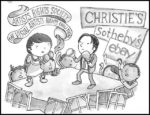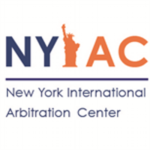Insights & Tips
September 28th, 2018 In New York the general policy is to facilitate the recognition and enforcement of foreign money and non-money judgments. Recognition is when a court converts a foreign judgment into a U.S. judgment which prevents re-litigation. On …
Recent news that Christie’s will auction off a piece of artificial intelligence art raises important questions about the legal implications of artificial intelligence art (“AI art”). The artwork to be sold was created at the direction of Paris-based c …
We have heard the story countless times: an unknown artists sells her work for pennies on the dollar only to see it’s value escalate to astronomical heights, as auction houses and gallerists catch the windfall. The California Resales Royalties Act (“C …
Recent international arbitration surveys list New York as the most favored arbitration site in the United States for commercial disputes. Studies conducted by University of Leicester (England) Law School and Queen Mary University in London found that …
Can a plaintiff recover trade secrets damages from a defendant for the costs the defendant avoided by misappropriating plaintiff’s trade secrets? Apparently not, according to the New York Court of Appeals. In E.J. Brooks Co. v. Cambridge Security Seals …
Alexander Wang x Judith Lieber clutch. Photo: @judithleiberny/Instagram Dhani Mau of Fashionista recently published a very useful overview describing the various fashion finance options available to burgeoning fashion entrepreneurs. Among these fashio …
When a company is sued for trade secret misappropriation, will an insurance company cover it? As made evident in Sentinel Insurance Company, LTD v. Yorktown Industries, Inc., 2017 U.S. Dist. LEXIS 14439, 2017 WL 446044 (N.D. Ill. Feb. 2, 2017), it ver …
In 2017, courts grappled with various issues with respect to the Defend Trade Secrets Act. First, there are nuances regarding the timing of the conduct to which the Act applies. In Cave Consulting Grp., Inc. v. Truven Health Analytics Inc., 2017 U.S. …
Traditionally, non-compete agreements were used to prevent employees from leaving a company and taking clients and important business information, including trade secrets, with them. In recent years, however, legislatures and courts have taken an incre …
In a decision that could drastically change the internet as we know it, Judge Katherine Forrest held that a news site’s embedded tweet could be considered an infringing “display” of material under the Copyright Act. Embedding, the process by which a we …
We wrote recently on the Second Circuit’s holding against former Hearst interns who claimed that the corporation violated federal and state wage and hour laws by not paying them. Shortly following the decision, the Department of Labor (DOL) issued “Fac …
In its recent decision, Crye Precision v. Duro Textiles, 689 Fed. Appx. 104 (2017), the Second Circuit scrutinized restrictions in an intellectual property licensing agreement under non-compete law, ultimately holding them to be overbroad. Traditionall …















